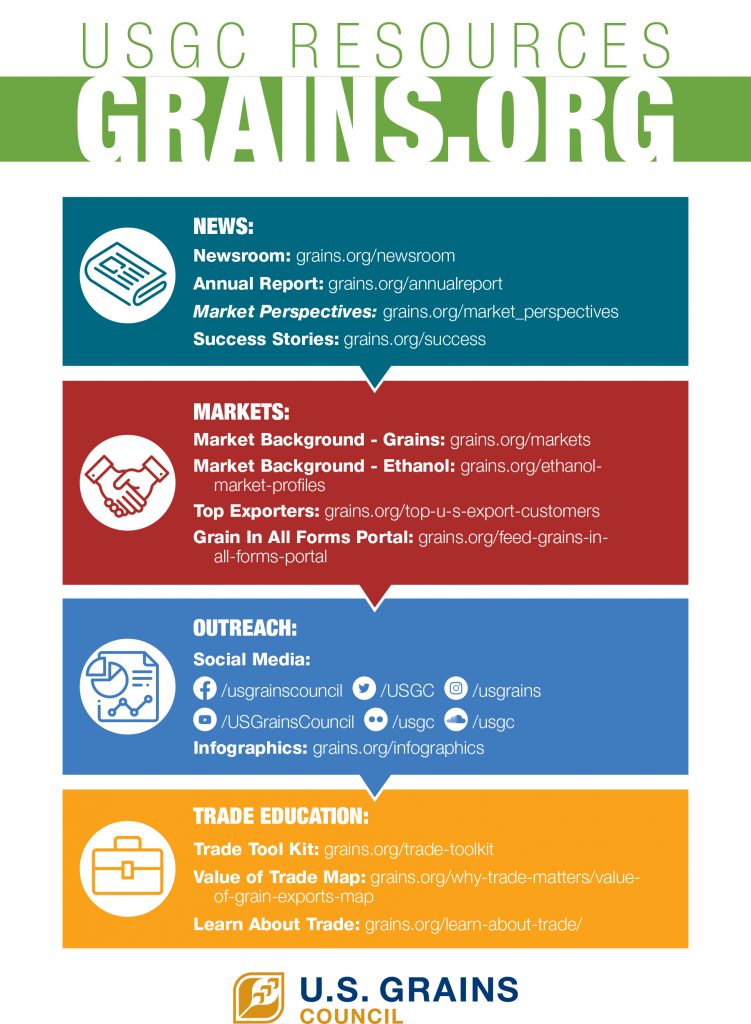The systems and agreements underlying global trade are complex but even more critical to understand as COVID-19 shines light on the supply chains underlying modern life and the importance of U.S. agriculture to feeding people all around the world.
The U.S. Grains Council (USGC) offers a trove of resources online to help farmers and other members of the grains value chain learn about key trade topics – and share their perspectives on how important trade is to their future prosperity.
Listen And Learn
Planters are running throughout much of the United States, making audio learning a good option for farmers wanting more context around trade topics.
Several podcasts focus exclusively on trade, including The Trade Guys and Trade Matters, both of which explore hot topics with a minimum of trade wonk language.
Siri, Genie and other voice assistants on smartphones can often read PDFs out loud, meaning reports that ordinarily would be a dense read could become audiobooks. A few suggestions to start are here and here.
Dive Deeper
Those who do find themselves with more time on their hands – or kids at home looking for fun home school projects – may want to dive deeper into trade topics.
The Council and the National Corn Growers Association published a plain-language backgrounder booklet on key trade topics last year, which would be interesting for high school students and adults alike. Another backgrounder that puts trade topics in good context was issued by the Congressional Research Service.
Other sites offering deeper dives into the economics and politics underlying the global trading system include USDA’s Foreign Agricultural Service (FAS) and Farm Foundation.
The Council’s Learn About Trade page offers links to a variety of reports and backgrounders on specific trade topics, including agreements with China, the new U.S.-Mexico-Canada Agreement and more.
The Council’s online market tools and data section also offers access to the Feed Grains In All Forms portal and Top Exporters page, where users can explore the latest numbers and longer-term trends in U.S. grains exports.
Engaging On Trade
Learning about trade is a worthwhile pursuit – but sharing personal stories about the impact of trade during a time of global disruption is even more critical for farmer-leaders.
Customers overseas and consumers closer to home have been clear in recent weeks that they want to hear directly from producers about their operations and supply chains during the COVID-19 disruptions. Times of crisis call for more communication even in local communities where most people have experience and familiarity with agriculture.
One estimate is that U.S. agriculture produces enough food for 2 billion people, in a country of just over 330 million people. Of course, most global population growth will be outside the United States in the coming decades, as well. These dynamics make trade critical to the long-term business models of U.S. farmers and agribusinesses.
As the COVID-19 crisis has emerged, several key corn markets have made large grain buys from U.S. suppliers, including Mexico, Japan and South Korea. These are markets in which organizations like the Council and its checkoff members have worked for many years to build relationships and confidence in the U.S. system.
On the Trade Toolkit page, the Council offers a variety of talking points, charts, sharegraphics and the like to help talk about trade and market development, especially on social media sites like Facebook and Twitter.
More importantly, though, is a local update – a snapshot from planting, for instance – and a personal statement about why continued engagement with global customers is part of running an agriculture business in a global economy.
About The U.S. Grains Council
The U.S. Grains Council develops export markets for U.S. barley, corn, sorghum and related products including distiller’s dried grains with solubles (DDGS) and ethanol. With full-time presence in 28 locations, the Council operates programs in more than 50 countries and the European Union. The Council believes exports are vital to global economic development and to U.S. agriculture’s profitability. Detailed information about the Council and its programs is online at www.grains.org.

